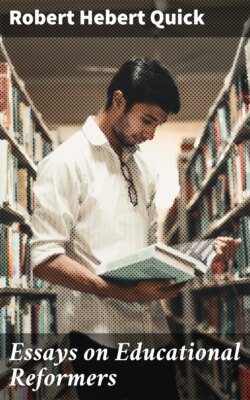Essays on Educational Reformers

Реклама. ООО «ЛитРес», ИНН: 7719571260.
Оглавление
Robert Hebert Quick. Essays on Educational Reformers
Essays on Educational Reformers
Table of Contents
I. EFFECTS OF THE RENASCENCE
II. RENASCENCE TENDENCIES
III. STURMIUS. 1507-1589
IV. SCHOOLS OF THE JESUITS
V. RABELAIS (1483-1553.)
VI. MONTAIGNE (1533-1592.)
VII. ASCHAM (1515-1568.)
VIII. MULCASTER (1531(?)-1611.)
IX. RATICHIUS (1571-1635.)
X. COMENIUS (1592-1671)
XI. THE GENTLEMEN OF PORT-ROYAL.[88]
XII. SOME ENGLISH WRITERS BEFORE LOCKE
XIII. LOCKE (1632-1704)
XIV. JEAN-JACQUES ROUSSEAU (1712-1778)
XV. BASEDOW AND THE PHILANTHROPINUM
XVI. PESTALOZZI. 1746-1827
XVII. FRIEDRICH FROEBEL (1783-1852.)
XVIII. JACOTOT, A METHODIZER. 1770-1840
XIX. HERBERT SPENCER.[185]
XX. THOUGHTS AND SUGGESTIONS
XXI. THE SCHOOLMASTER’S MORAL AND RELIGIOUS INFLUENCE
XXII. CONCLUSION
Footnote
APPENDIX
SYLLABUS. OF QUICK’S EDUCATIONAL REFORMERS
Pages 1 to 62
II. STURM
III. THE JESUITS
Pages 63 to 171
RABELAIS
MONTAIGNE
ASCHAM
MULCASTER
RATKE
COMENIUS
Pages 172 to 218
THE PORT-ROYALISTS
SOME ENGLISH WRITERS BEFORE LOCKE
Pages 219 to 238
JOHN LOCKE
Pages 239 to 289
ROUSSEAU
BASEDOW
Pages 290 to 383
PESTALOZZI. I. HIS LIFE
II. PESTALOZZI’S PRINCIPLES
Pages 384 to 413
FRIEDRICH FROEBEL
FROEBEL’S EDUCATIONAL PRINCIPLES
Pages 414 to 469
JACOTOT
HERBERT SPENCER
Pages 470 to 503
I. THOUGHTS AND SUGGESTIONS
II. MORAL AND RELIGIOUS INFLUENCE
Pages 504 to 547
REVIEW OF EDUCATIONAL PROGRESS
INDEX
Отрывок из книги
Robert Hebert Quick
Published by Good Press, 2021
.....
§ 17. V. In conclusion I must point out one effect of the Renascence ideal which seems to me no less mischievous than those I have already mentioned. This ideal led the schoolmasters to attach little importance to the education of children. Directly their pupils were old enough for Latin Grammar the schoolmasters were quite at home; but till then the children’s time seemed to them of small value, and they neither knew nor cared to know how to employ it. If the little ones could learn by heart forms of words which would afterwards “come in useful,” the schoolmasters were ready to assist such learning by unsparing application of the rod, but no other learning seemed worthy even of a caning. Absorbed in the world of books they overlooked the world of nature. Galileo complains that he could not induce them to look through his telescope, for they held that truth could be arrived at only by comparison of MSS. No wonder then that they had so little sympathy with children, and did not know how to teach them. It is by slow degrees that we are breaking away from the bad tradition then established, are getting to understand children, and with such leaders as Rousseau, Pestalozzi, and Froebel, are investigating the best education for them. We no longer think of them as immature men and women, but see that each stage has its own completeness, and that there is a perfection in childhood which must precede the perfection of manhood just as truly as the flower goes before the fruit. “Childhood,” says Rousseau, “has its own ways of seeing, feeling, thinking;” and it is by studying these that we find out how children should be educated. Our connexion with the world of nature seems much closer in our early years than ever afterwards. The child’s mind seems drawn out to its surroundings. He is intensely interested in the new world in which he finds himself, and whilst so many of us grown people need a flapper, like the sages of Laputa, to call our attention from our own thoughts to anything that meets the eye or ear, the child sees and hears everything, and everything seen or heard becomes associated in his mind not so much with thought as with feeling. Hence it is that we most of us look back wistfully to our early days, and confess sorrowfully that though years may have brought “the philosophic mind,”
“ ... Nothing can bring back the hour
.....